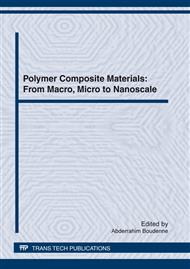p.153
p.159
p.167
p.175
p.183
p.193
p.201
p.211
p.217
Silsesquioxanes as Modifying Agents of Methylvinylsilicone Rubber
Abstract:
The idea and methods of methylvinylsilicone rubber modification are present. Polyhedral oligomeric silsesquioxanes (POSS) functionalized by vinyl-, carboxyl or amino-organic groups were used with the goal of modifying the rubber matrix. Additionally, oxazoline derivative and itaconic acid were used as the coupling agents. Generally, the process of modification contributed to increasing of rubber-filler interactions, however the useful properties of composites depended on a kind of active groups and way of modifications. It has been shown how grafting of POSS molecules to silicone backbone affects the cross-link density, rheometrical and mechanical properties, hysteresis and relaxation rates of the methylvinylsilicone rubber vulcanizates. Moreover, both the presence of silsesquioxanes and the way of composites preparing affect the improvement of filler dispersion degree in the rubber matrix, as indicated by SEM images. The most significant effect was observed for vinylisobutyl-POSS grafting to the silicone backbone which resulted in the considerably improved mechanical properties of the resulting network.
Info:
Periodical:
Pages:
183-189
DOI:
Citation:
Online since:
March 2012
Authors:
Keywords:
Price:
Сopyright:
© 2012 Trans Tech Publications Ltd. All Rights Reserved
Share:
Citation:


